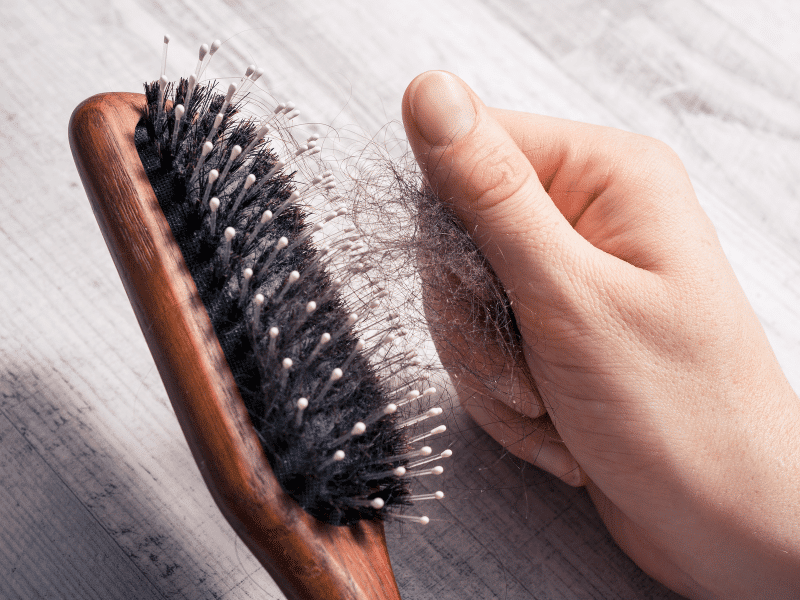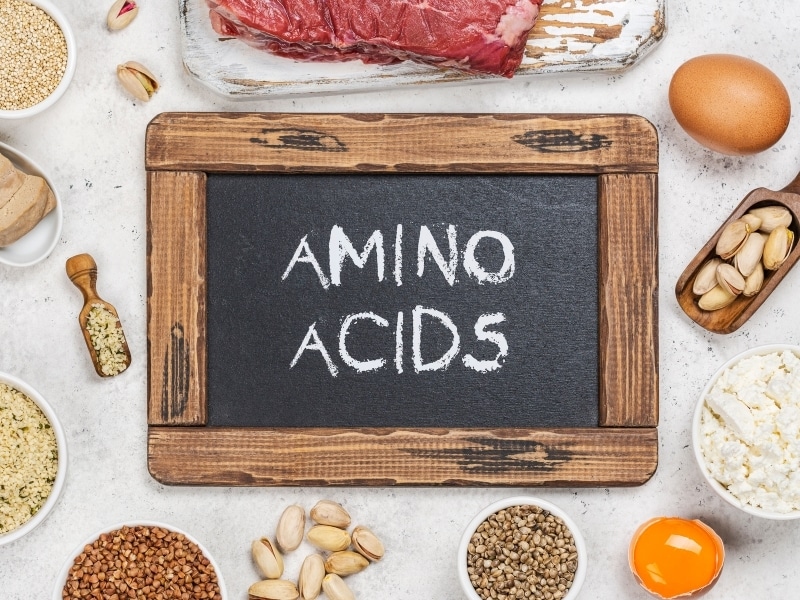
Finding a lot of hair in your brush/comb is a common sight these days, hair shedding is a part of the natural balance of the hair cycle, you get some when you lose some!
Usually, losing 50-100 hair strands is considered normal. It is the excessive shedding of hair that is a matter of concern.
Before we jump onto what’s causing hairfall, let’s quickly learn a little about our hair cycle phases!
The growing phase, known as the Anagen Phase which lasts from two to eight years, then comes the transition phase, known as the Catagen Phase when hair follicle shrinks, lasting for two to three weeks and then comes the third phase of Telogen when hair falls out, takes about two to four months.
The Hair Cycle

- The Anagen Phase (growing phase): last from two to eight years, 85-90% of hair at a time.
- The Catagen Phase (transition phase): last for two to three weeks, hair follicle shrinks.
- The Telogen Phase (telogen phase): takes about two to four months, hair falls out.
You can find hair loss signs, when
- Hair clogging in the shower.
- Excessive hair strands in hair combs, clothes & pillow.
- Seeing noticeable bald patches over your head.
- Shrinking ponytail
- Hair breakage
- Blood tests indicating low levels of vitamin and mineral levels (like Iron, zinc, vitamin B and vitamin D).
- Thinning patches of hair or baldness.
Getting too technical? Let’s jump to the reasons, some little known to us as WHY are you losing your hair!
Hair fall reasons

Stress and more stress
We require basic stress for that motivation for everyday tasks and fulfilments. The problem arises when that little stress turns into a giant dark cloud to suck all our energy!
Extreme physical and emotional stress is one of the common hair fall reasons. It can cause temporary hair loss, baldness and hair thinning and disrupts the hair cycle leading it to the shedding phase. (Yes you heard us right!)
Life unfolds many things as we grow, and it is understandable to be overwhelmed at any stage. Uncertain times can surprise us all with so many emotions and feelings.
The best way to move ahead from any ambiguity is to accept the situation, ask for help, and communicate with your family, friends, or anybody but don’t bottle up for too long! You are braver than you think!
Try making some lifestyle changes like finding a hobby, read books, inculcate nutrition-rich food in your diet, listen to music, meditate, do yoga, or simply anything that eases your nerve and makes you feel relaxed!
Nutritional Deficiency



Extreme diets or lack of proper diet can make people low in certain vitamins and protein that can cause hair shedding.
Keep your blood levels checked, to keep a tab on any deficiency through a doctor’s consultation.
The essential nutrients that are helpful in preventing hair fall are:
- Vitamin D (esp. vitamin D3)
- Vitamin B-12
- Biotin
- Iron
- Selenium
- Vitamin A
- Vitamin C
- Folic acid
- zinc
Hormonal Imbalance
Women are blessed with so much but sometimes come at a cost of facing many health changes!
Women after pregnancy and menopause can see a pattern of hair loss. After menopause, you might notice thinner hair because hair follicle shrinks.
Hair loss is also common after childbirth, the postpartum period sees a sudden decrease in estrogen levels that is high during pregnancy. You can see hair loss after approximately 3 months of delivering baby. Hair grows back normally without any medication.
Due to the hormone, dihydrotestosterone (DHT) a person suffers hair loss as hair follicles respond to it. Birth control pills also affect hormones and may cause hair loss.
The other hormone related to hair fall is abnormal thyroid (both too much & too little). Hormonal imbalance can also occur due to Polycystic Ovary Syndrome (PCOS).

Erratic Sleep
Sleep is so essential. Period. Sleep deprivation, extreme insomnia, and poor sleeping patterns are all major reasons for any health deterioration, it especially affects the hair quality, and texture and ultimately results into hair thinning, hair fall and many other ill effects. Lack of sleep simply interrupts rejuvenating hair follicles and…boom! causes hair fall.
Post Illness
During different phases of the hair growth cycle, under certain medications like chemotherapy or post-illness, a physical shock can trigger hair loss.
During viral fever or any other illness, hair fall is temporary. Hair grows back and returns to its normal cycle within six to nine months.
Smoking
Tobacco or cigarette can potentially damage your hair resulting in hair fall. The toxic chemicals in cigarettes disrupt normal blood circulation and the hair cycle. Along with blood circulation, weak immune system increases the chances of fungal infection on the scalp.
Sudden Increase/Decrease In Weight
Our body is sensitive to rapid weight loss and restrictive diets. Hair falls due to a restrictive diet is linked to telogen effluvium.
Your hair needs adequate nutrients to grow properly, when it doesn’t receive what it requires to grow, hair falls.
Amino acids are building blocks of protein, taking enough can help you build the protein requirement of your body for healthy and fuller hair.

Genetics
Hereditary hair loss is a little difficult to treat, though you may go for procedures like hair transplants to reduce the appearance of baldness.
Many women & men notice thinning of hair in their early 30s and 40s, the reason could be in genes. The first sign of hereditary hair loss can be the overall thinning of hair and receding hairline.
Excess chemical products and hair color
Frequent colouring sessions and hair dyes that are loaded with harmful chemicals like ammonia and hydrogen peroxide can cause hair fall.
Also, colouring your hair requires heavy combing and continuous rubbing that can be hurtful to your already sensitive hair.
Auto-Immune Diseases
There can be other medical reasons for abnormal balding like alopecia areata, alopecia areata is an autoimmune disease that causes bald patches on your head.

Certain key points to prevent hair fall
- Do not pull, twist or rub your hair when its wet.
- Use a gentle shampoo and conditioner when you’re prone to hair fall.
- Do not wear tight hairstyles that put pressure on your hair follicles, tight ponytail can cause traction alopecia.
- A well balanced diet is solution to your many problems.
- Minimalize use of heat styling products and harsh chemical hair colors.
- Massage your head while you oil your hair to stimulate hair follicles.
- Be genntle with your hair, use a detangler or a wide tooth comb.
Conclusion
Well don’t be overwhelmed after reading all this! There’s always a way to fix and give the right treatment to hair fall after you diagnose the reason! If in case you feel that despite keeping all parameters in line you are facing hair fall, consult a doctor for help to understand the underlying cause.
Do you want to know the easy ways to prevent hair fall? Follow ‘Hairmegood’ for solutions, tips, and remedies to fix your hair-related problems!

Itís difficult to find well-informed people in this particular subject, but you sound like you know what youíre talking about! Thanks